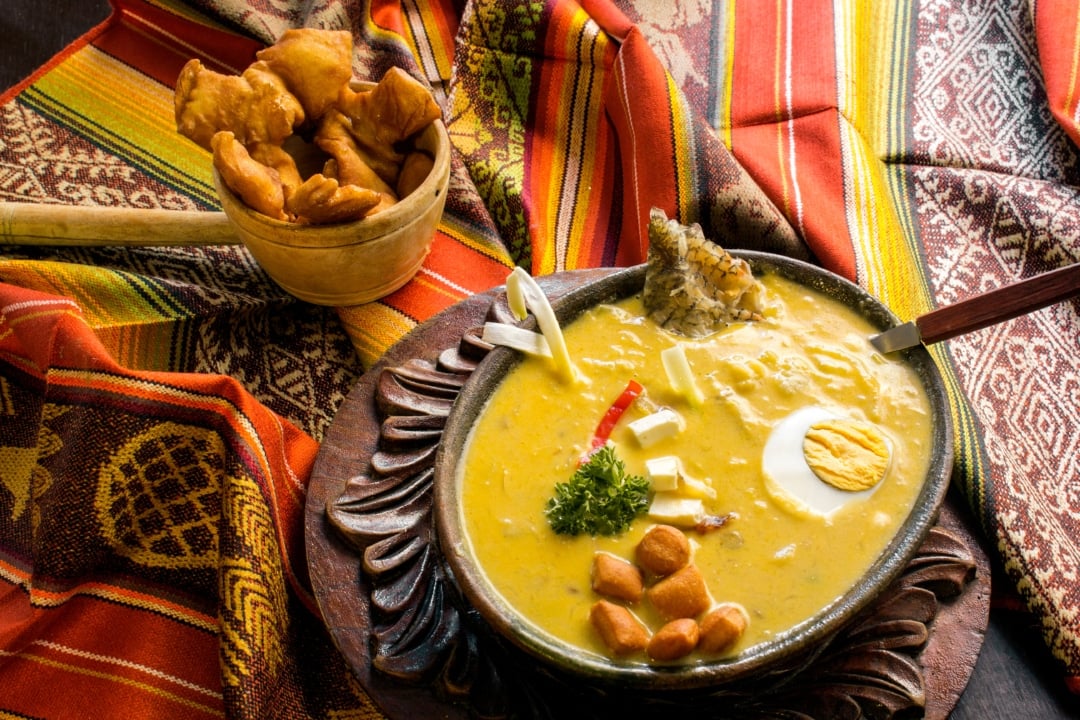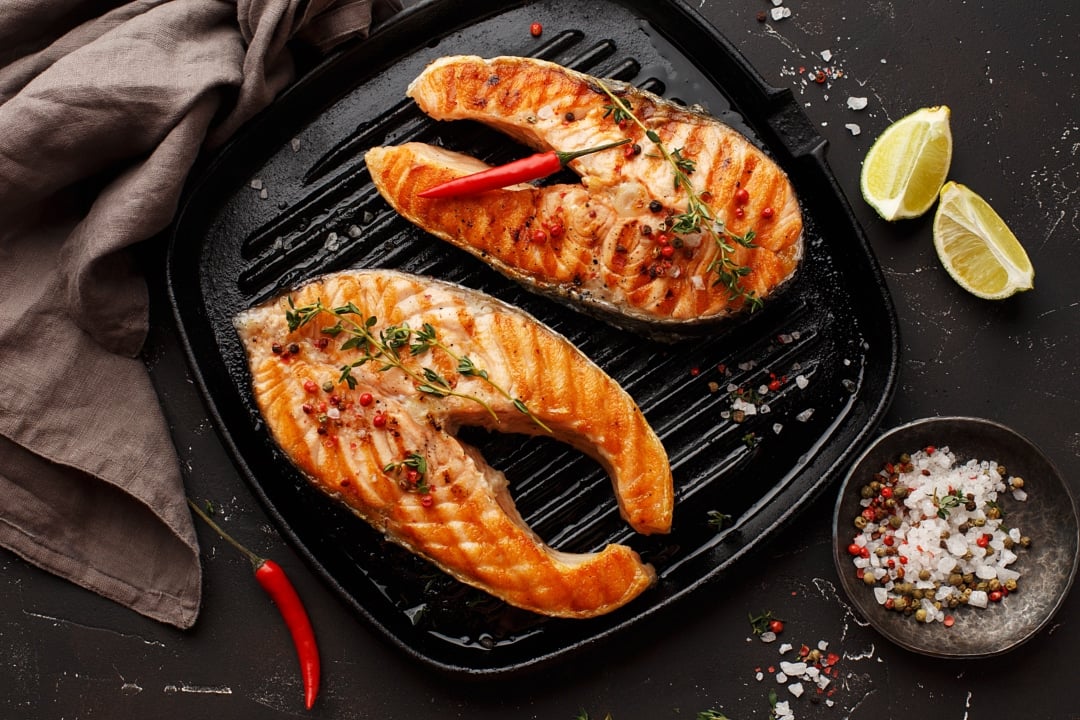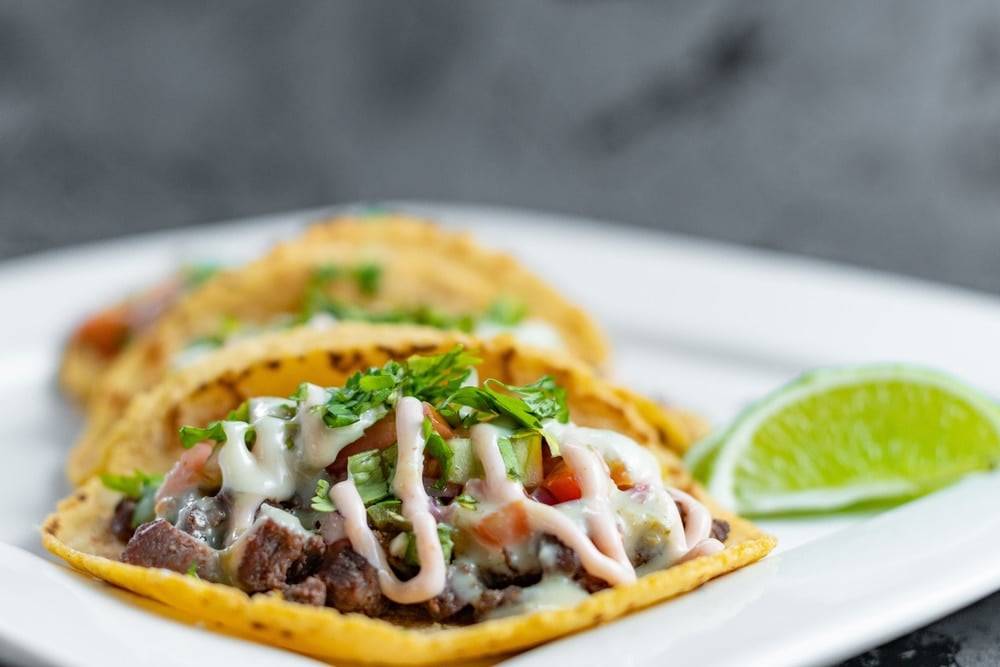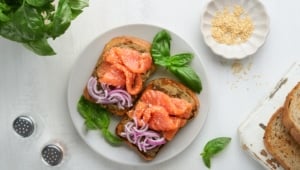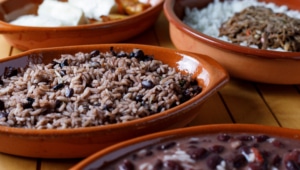Nigerian Food: 12 Popular Dishes + 5 Secret Recipes
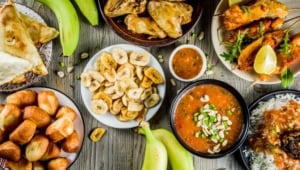
Nigerian food is one of the most diverse cuisines in the world. Every ethnic group and tribe has a different food that consists of beans, herbs, grains, and spices. Like other cuisines in West Africa, Nigerian food is aromatic and spicy too. Here you can learn more about nigerian food.
From plenty of ‘swallow foods’ like soups and stews to flavorsome staples, you’ll enjoy every type of traditional Nigerian cuisine. If you’re considering stepping into the West African kitchen, this is the right place to start.
In this post, we’ve jotted down everything for beginners who want to master Nigerian cuisine. And if you’re a pro, you’ll be able to learn some secret recipe tips and enhance your cooking skills. This article talks about:
- Traditional Nigerian cuisine, its origin, and the background of its culinary history
- Best and the most popular traditional Nigerian dishes and where they are popular
- Ingredients, herbs, spices and cooking techniques that make Nigerian cuisine different from other cuisines
- Nigerian meal structure and their eating habits so that you understand more about the Nigerian cuisine
Traditional Nigerian Cuisine – More Than Fufu and Moi Moi
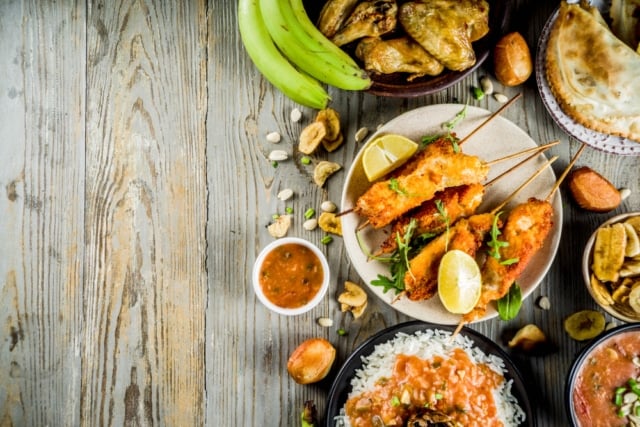
Traditional Nigerian Cuisine – More Than Fufu and Moi Moi
Traditional Nigerian cuisine consists of more than 250 dishes from different ethnic groups. Their cuisine traditionally consists of rice, potatoes, chicken, couscous, and grills.
Nigerians mostly eat locally grown vegetables, fruits, grains, cereals, and meat. Starchy foods like rice, cassava, yam, beans, and plantains are very common in Nigerian cuisine.
Nigerian culture is a mix of several different cultures. It originated because of inter-tribal marriages and migrations within African countries. For this reason, Nigerian food has influences from its neighboring countries, including Ghana, Togo, Senegal/Gambia, Liberia, and Senegal.
According to historians, Nigerian Jollof rice was popular in Africa centuries ago, and it played an important role in the origin of Nigerian cuisine.
Besides Jollof rice, several other foods contributed to Nigerian food’s origin. These foods include Egusi soup, soup with Banga, Moi Moi, and Edikang-Ikong. Nigerian food has multiple flavors, textures, and aromas, and it has something for all types of food lovers.
Nigerian Food in the World
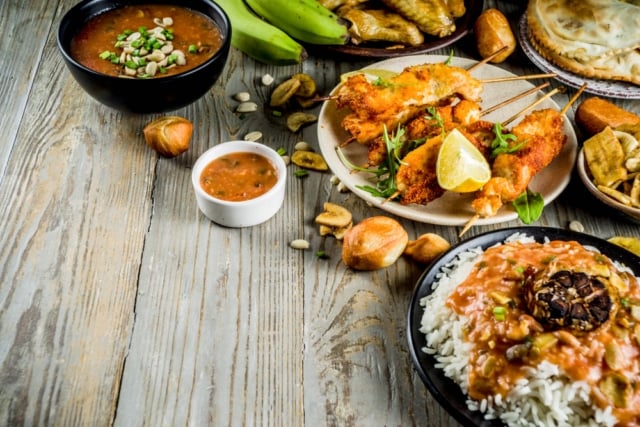
Nigerian Food in the World
Nigeria is a land of different tribes, dialects, and ethnic groups. For this reason, Nigerian food is quite diverse, aromatic, and lavish. The traders and explorers who came to Nigeria had a significant influence on Nigerian cuisine. For example, Portuguese traders brought cassava to Nigeria.
Plus, European explorers and traders brought beans and maize here. Besides that, Asian spices, herbs, and seasonings, including cinnamon, pepper, and nutmeg, are also used in Nigerian cuisine.
Earlier, Nigerian food wasn’t very popular, but now it’s becoming more common in different parts of the world. Various Nigerian restaurants around the globe offer authentic Nigerian food.
For instance, you’ll easily find Nigerian foods in the U.S., Dubai, and London. The following are the most popular Nigerian foods in the world:
Jollof Rice
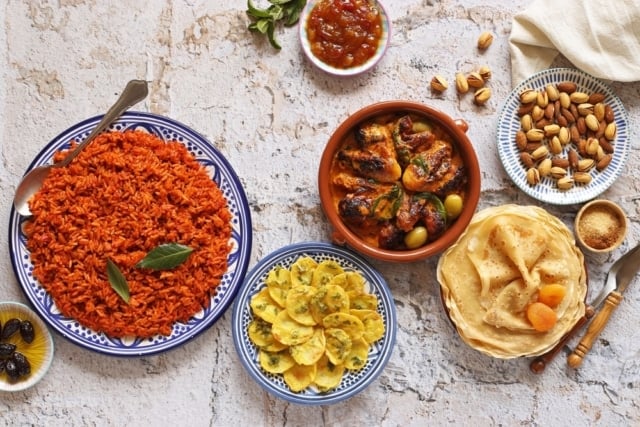
Jollof Rice
Jollof rice is a popular African dish, and it is known to have originated in Nigeria. Nigerians are experts in cooking Jollof rice, and even Ghanaians are learning how to make it.
This rice dish is eaten almost at every event, lunch, or Sunday. Long-grain rice is used for cooking this dish, along with onions, tomatoes, and spices.
Jollof rice is made by cooking rice in a spicy tomato broth. The method of cooking varies from region to region. It is served with meat and vegetables too. For instance, in some regions, it is served with fish, while in others, it is served with chicken or turkey.
Puff Puff

Puff Puff
Puff puffs are a snack popular in several countries. These sweet flour balls are deep-fried to make them golden brown. Since this dish uses simple ingredients, you can make it anywhere in the world. However, if you don’t want to make them yourself, you can find them at a local pastry shop.
For example, in South Africa, they are known as Magwinya, and in France, they are called Beignets. They are super delicious—crispy on the outside and soft on the inside.
Dodo

Dodo
Dodo is not a non-vegetarian dish, as it seems. It is fried, ripe plantains. It is very popular in Nigeria but is also available in other parts of the world.
Plantains, or cooking bananas, are available in Africa, Asia, and South and Central America. Some people bake them, while others fry them to make them crispier.
Nigerians cut them in a particular way to complement the type of dish. For instance, to serve with jollof rice, they cut them into cubes. To serve with stewed beans, they cut the plantains into rounds.
Noodles

Noodles
Nigeria’s Indomie is popular around the world. We have eaten those noodles, but no one knew they were from Nigeria. Nigerians prepare Indomie noodles in various ways.
There are several ways to serve these noodles, too. For instance, you can have it with tomatoes, onions, carrots, and eggs. These noodles have a balanced amount of pepper and seasoning for different tastes.
Akara

Akara
Akara are black-eyed pea fritters. It is a popular breakfast item in Nigeria. It is made by crushing cooked black-eyed peas and mixing them with salt, pepper, palm oil, and shredded onions.
It has a crispy and crunchy outer skin and tastes best when served with cereal for breakfast. In Brazil, this dish is known as ‘acaraje’. Some people believe that Akara was brought to West Africa by Brazil.
How Healthy Is Nigerian Food?

How Healthy Is Nigerian Food?
Nigerian food is mostly rich in fiber and low in calories. This is because Nigeria is blessed with plenty of natural resources, including staple foods.
Plus, there is a vast variety of herbs, spices, and vegetables. All these ingredients not only make the cuisine flavorsome but also very healthy. Most Nigerian foods contain vitamins, minerals, carbohydrates, and dietary fibers.
Besides that, Nigerian cuisine involves slow cooking, which helps maintain the health benefits of the nutrients in the food. Plus, most of their foods are made from scratch, meaning no additives or preservatives are used. The following are the main reasons why Nigerian food is considered healthy:
- Fresh whole ingredients: Nigerian foods use whole grains, vegetables, fruits, beans, and lean proteins. All these ingredients are used fresh, and they contain plenty of nutrients.
- Variety of spices and herbs: Nigerian cuisine uses a lot of spices and herbs. Using whole spices also eliminates the need to add excessive salt or ground spices. The cuisine also uses garlic, ginger, and turmeric.
- Balanced food: The cuisine focuses on the importance of a balanced diet. Most of their dishes have a good balance of proteins, carbs, vitamins, fats, and minerals. This makes Nigerian cuisine a complete and nutritious meal.
- More use of vegetables: Nigerian foods use lots of different vegetables. For example, onions, tomatoes, potatoes, eggplant, okra, and spinach are common in their foods. Vegetables play an important role in maintaining various body functions.
- Lesser use of processed foods: Nigerian cuisine doesn’t rely on processed foods. Processed foods contain lots of fats, additives, and preservatives and are high in calories.
A study on the Nigerian diet states that the traditional Nigerian diet is healthy. However, it also states that today’s Nigerian diet is an evolved version and includes high levels of fat and sugar. Thus, it is important to follow traditional Nigerian cuisine.
12 Famous Nigerian Dishes You Have to Try

12 Famous Nigerian Dishes You Have to Try
Nigerian foods are mouth-watering and scrumptious. The country has a food culture packed with flavors, aromas, and spices native to Nigeria. Nigerian cuisine is similar to that of other Western African countries. The cuisine features pungent, smoky, sour, bitter, spicy, and umami flavors.
The more prominent flavors in Nigerian foods are umami, smoky, and spicy. Their staple foods include fufu, rice, yam, beans, plantains, cassava, and sweet potatoes.
Whether you’re in Nigeria or going to try cooking at home, there are a few dishes you shouldn’t miss. These are the most popular Nigerian dishes worth trying for every food lover. Have a look at the top 12 popular Nigerian dishes.
Soups & Salads

Soups & Salads
Nigerian cuisine consists of a variety of soups and salads. Some of the soups are starchy, but others are low-calorie. So, whether you’re willing to have a burst of flavors or want something nutritious, you can choose from the never-ending list.
The best thing about Nigerian soups is that no two soups taste the same. The cuisine consists of various soups, including spicy, sour, sweet, and nutty.
Besides the delicious soups, Nigerians also have a variety of salads in their cuisine. Nigerian salads consist of different types of fresh vegetables and boiled eggs. Have a look at a few popular soups and salads from Nigerian cuisine.
Egusi Soup

Egusi Soup
Nigerian egusi soup is well-loved by everyone. It is very nutritious as it is packed with several types of vitamins, including vitamins A, B1, B2, and C.
The soup is made from melon seeds, which thicken the soup. Besides the seeds, the soup contains meat, seafood, mushrooms, Awara, and greens. The soup has a nutty and spicy flavor and a rich feel because of the meat. Nigerians love to pair it with yam and fufu, as it goes very well with them.
Banga Soup (Ofe Akwu)

Banga Soup (Ofe Akwu)
Banga Soup is made from palm nut fruit and is quick and delicious. Palm nuts are native to West and Central Africa. The nutty and delicious flavor of the soup is because of the palm nut.
This soup is also a staple dish in West Africa, known as Ofe Akwu in many regions. Besides palm nuts, various types of spices are used in the soup, including cayenne pepper, bouillon powder, Banga spice, and ground crayfish.
Classic Nigerian Salad

Classic Nigerian Salad
The classic Nigerian salad is a colorful, nutritious, and lively salad. It is very easy to make and can be used as an appetizer or a main dish. The salad includes raw and cooked vegetables, eggs, and pasta. The salad pairs well with Jollof rice and fried chicken.
The main ingredients in this salad are cabbage and lettuce. Besides that, it also contains tomatoes, cucumber, eggs, sweet corn, pasta, and baked beans.
Starters, Sandwiches, Sides

Starters, Sandwiches, Sides
Nigerians love to party; without starters and appetizers, their parties are incomplete. They are hard-working people, but they party hard, too, when they party.
A typical Nigerian party includes music, dancing, and, most importantly, party foods. Nigerians also love to have a variety of food on the table. This is why starters and appetizers are an important part of their meals. If you want to learn about some of their best starters, here are the three most popular ones.
Suya

Suya
Suya is a very delicious grilled meat. It is spicy and tender and is served with a spicy blend of flavors known as yaji and sliced red onions. Besides Nigeria, this appetizer is also popular in West Africa and other countries. It is a popular street food in Nigeria, especially in Lagos.
The meat used for Suya is mostly chicken, gizzard, beef, or cow hump. The meat is marinated and then put on skewers for grilling. The meat is then barbecued to enhance its flavors. Preparing suya is all about using the right amounts of ingredients and oil.
Pepper Snail

Pepper Snail
Peppered snails are used as appetizers at Nigerian parties and gatherings. Snails are gluten-free and protein-rich, so they are considered healthy snacks. Besides that, they are low in calories and packed with iron and omega-3.
Nigerians prepare this snack by marinating the snail with salt, garlic, peppers, and onion. Snails are first boiled and then deep-fried to become crunchy and crispy. Once fried, they are dipped into pepper sauce for a final touch.
Club Sandwich

Club Sandwich
The Nigerian club sandwich is very easy to make. Most Nigerians love to eat club sandwiches made out of sardines. They use Titus sardines or season sardines to make this delicious sandwich.
First, the sardines are boiled and shredded. Then, they add butter, salt, and cayenne pepper to it and make a paste. The paste is then spread on bread slices to make sandwiches. These are healthy and quick snacks, and Nigerian kids love to eat them.
Mains

Mains
Nigerian cuisine includes a variety of main courses. These meals are simple as well as complex. You must start with the basics if you’re new to Nigerian cuisine.
Nigerians don’t use multiple foods in their mains; only one dish is enough for them. It could be anything paired with staple food, for instance, jollof rice or yam.
These mains are also paired with swallows, such as Eba and Lafun, prepared from cassava meal. Here are the three main meals popular in Nigerian cuisine.
Edikang Ikong

Edikang Ikong
Edikang Ikong is Nigeria’s signature dish. It is prepared from fluted pumpkin and water leaves. The leaves are boiled and mixed with salt and palm oil. It is basically a vegetable dish, but meat lovers can add meat and fish to improve the flavor.
In Nigeria, people eat Edikang Ikong with yam or fufu. It is highly nutritious, as it contains a good amount of fresh leaves packed with iron. Meat, like dry fish or goat meat, fulfills the protein requirements.
Nkwobi
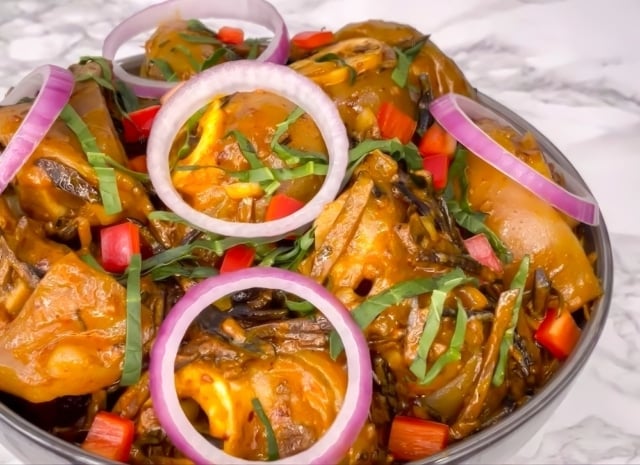
Nkwobi
Nkwobi, or spicy cow foot, is available at various Nigerian restaurants. The cow’s foot is first marinated with a spicy palm oil paste. Most Nigerians use pressure cookers to cook cow foot, as it takes several hours to tenderize it.
This is a traditional Nigerian dish that requires several rare ingredients. For instance, it requires potash, calabash nuts (Ehu), and utazi. It also includes ground crayfish.
Ewa Agoyin

Ewa Agoyin
Ewa Agoyin is very popular in western Nigeria. Yoruba people from this region love to eat this dish often. It is very healthy, as it is prepared with mashed beans.
Besides beans, the recipe includes pepper sauce, crayfish, onion, tomato, and spices. The beans are cooked until they are very soft, then mashed. The pepper sauce is prepared separately and includes all the remaining ingredients mentioned earlier.
Breads, Pastries, and Desserts

Breads, Pastries, and Desserts
Nigerian cuisine features mouth-watering desserts, pastries, and soft and fluffy breads. Though rice is their staple food, there are a variety of breads in this cuisine that can be paired with their main meals.
Most of their desserts are made with flour, milk, coconut, cassava, plantains, and butter. Have a look at these popular breads and desserts from Nigeria:
Agege Bread

Agege Bread
Agege bread is fluffy and delicious. It is made with bread flour, milk, eggs, and active dry yeast. It is prepared one day in advance as it contains yeast, which takes time to rise.
The chewy and stretchy texture makes it a popular choice in Nigeria. People there love to eat it with Moin moin, akara, or stew. It is so delicious that people consume it plain with a smothering of butter.
Chin Chin

Chin Chin
Chin-chin is a popular snack in Nigeria. These are made from flour, butter, sugar, and milk. They are kneaded into wheat dough and then fried into crunchy strips.
There are many variations of chinchilla in West Africa. Depending on your preference, you can make it crunchier from the outside and fluffier from the inside. Sometimes baking powder is also added to it to improve the texture.
Coconut Candy

Coconut Candy
Coconut candy is both a dessert snack and a finger food. Both adults and children in Nigeria enjoy it. People consume it as it is and sometimes use it as a topping for ice cream. It is made from shredded coconut and granulated sugar.
5 Secret Recipe Tips

5 Secret Recipe Tips
Every cuisine has some secret recipes and tips that only cooking enthusiasts know. If you want to master a particular cuisine, you must learn these tips.
For instance, some cuisines use special blends of spices in many dishes to give them a unique flavor. Similarly, there are some cooking techniques and tips that Nigerians use. Here are a few secret tips to help you get started:
Use Wooden Spoons

Use Wooden Spoons
Never use metal spoons for cooking, especially in Nigerian cuisine. Nigerian cuisine includes stews and soups that might be ruined by metal spoons. Using wooden spoons works best for Nigerian foods.
You’ll feel the difference in taste when you use wooden spoons instead of metal spoons. Besides affecting the food’s texture and taste, metal spoons also damage the cookware.
Don’t Grate Okro

Don’t Grate Okro
Some people prefer to grate Okro because it is easier and helps you do the job quickly. However, cutting Okro makes it taste better. When you use grated okro, it cooks quickly and gets too tender.
However, chopped okro is more delicious as it is in better form. When you chop okro, it doesn’t get tender quickly like the grated one.
Always Add Meat Stock

Always Add Meat Stock
No matter what you’re cooking, adding a dash of meat or chicken stock improves the flavor. For instance, if you’re making pepper soup or tomato stew, add meat stock instead of a lot of water.
You might be thinking that preparing meat stock would be a lengthy process. You can prepare meat stock beforehand and store it for later use. Only a dash of meat stock will do the job of improving the flavor.
Marination Is the Key

Marination Is the Key
Nigerian cuisine involves the use of plenty of spices. Plus, some spices are mixed and blended in a specific way. To bring out the best flavors in your food, you must marinate the meat a few hours before cooking. This allows the spices to penetrate deeper into the meat, resulting in a juicy, delicious meal.
The Party Jollof Secret

The Party Jollof Secret
You might have heard about the party at Jollof Rice. It is found at almost all parties and events in Nigerian households. These Jollof rice are prepared differently and are tastier than the traditional way of cooking.
You can achieve this unique flavor by adding a sheet of foil to the pot while cooking jollof rice. This way, the rice will not get soggy and will taste amazing.
Beverages

Beverages
Nigeria has different types of climates according to different regions. However, the climate is mostly tropical, so Nigerians have to bear heat throughout the year.
To beat the heat, Nigerians rely on refreshing beverages. Nigerian cuisine includes a variety of drinks, such as alcoholic, non-alcoholic, traditional, and fermented. The following are the most popular Nigerian drinks.
Chapman

Chapman
Chapman is a cocktail that combines different sodas, mostly Sprite, Fanta, Grenadine, and Angostura. All these ingredients are mixed and then poured into a glass containing ice. It is a colorful cocktail and is loved in Nigeria. It originated in Lagos, but now it’s common all over Nigeria.
Ugu Juice

Ugu Juice
Ugu juice is a green juice rich in nutrients. It is made from pumpkin leaves and is an alternative to carbonated drinks. The extract of Ugu, or pumpkin leaf, has many benefits as it is a good source of minerals and vitamin D. Most vegetarians love drinking Ugu juice.
Kunu Zaki

Kunu Zaki
Kunu Zaki is a refreshing drink from corn, sorghum, or whole millet grains. The drink has a nutty, spicy flavor and is rich in fiber and protein. Kunu Zaki, also known as millet drink, is consumed in porridge form.
Pito

Pito
Pito is often considered a beer. It is made with fermented millet, and sometimes sorghum is also used. Pito is a common drink in West Africa, especially in Ghana and Nigeria. The drink is amber or dark brown and has a sweet and slightly sour taste. Before serving, the drink is strained and poured into a gourd.
Zobo

Zobo
Zobo, or Zoborodo, is made from dried roselle leaves. The drink also contains ginger, garlic, and pineapple. It has a red-wine color and can be easily prepared at home. Zobo is a nutritious drink that can control blood pressure and stress.
Ingredients
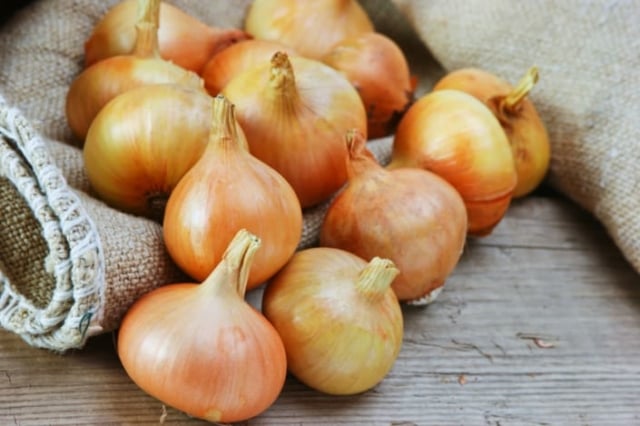
Ingredients
Like every cuisine, Nigerian cuisine has some essential ingredients. These ingredients are easily available in Nigerian markets and across the world.
You’ll need various ingredients since Nigerian meals are packed with many flavors, aromas, and textures. If you’re deciding to try Nigerian foods, you should have these ingredients in your kitchen:
- Palm Oil
- Black Eyed Beans
- Rice
- Stock Cubes
- Garri
- Smoked Crayfish
- Onion
- Plum Tomatoes
- Plain Flour
Herbs and Spices
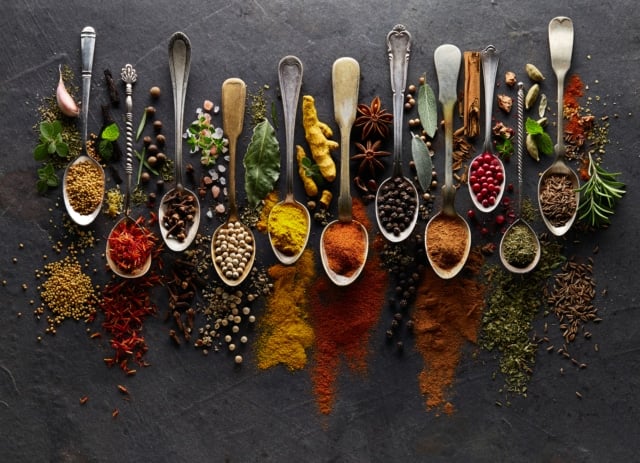
Herbs and Spices
Nigerian cuisine requires the right blend of herbs and spices to bring out the right type of flavor. Also, some herbs and spices are commonly used in other cuisines.
However, learning how to use different types of herbs and spices for different foods is important. Also, cooking techniques play an important role in making a cuisine unique. The following are some important herbs and spices used in Nigerian cuisine:
- Spring onions
- Aniseeds
- Nutmeg
- Bay Leaf
- Cloves
- Thyme
- Curry powder
Nigerian Food Culture

Nigerian Food Culture
Nigerian food culture varies as we move from one ethnic group to another. Nigerian men have to provide money to purchase food according to their culture.
Whereas the women have to shop and prepare the food. Most Nigerian men like their wives to relax at home, prepare food for the family, and care for the kids. Besides these, there are a few customs that are followed in the Nigerian food culture.
Eating Habits

Eating Habits
In Nigerian culture, when two people eat together, the younger one must wait to eat fish or meat. However, the elder one can give their meat or fish to the younger one from their portion.
Also, Nigerians eat and drink at different times. And if you’re eating with Nigerians, you shouldn’t pour a drink yourself; instead, wait to be served. Lastly, Nigerians avoid talking while eating to prevent choking or other accidents. Once the meal is complete, a small burp indicates that the person is satisfied.
Meals Structure
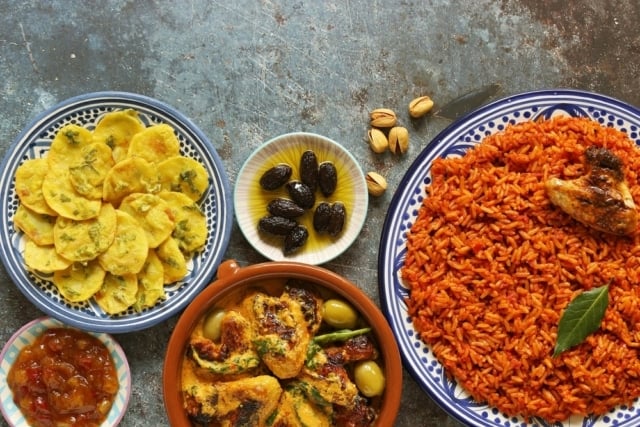
Meals Structure
Nigerians mostly eat two large meals daily, along with a light breakfast. Their most important meal is the one that is served at noon. They usually eat yams, bread, cereal, stew, or moi moi for breakfast.
Their lunch includes rice, meat, fish, chicken, spaghetti, fufu, and soups. Nigerian dinner mainly comprises vegetables, fish, stew, plantains, yam, and macaroni. Their meals are largely based on lentils, beans, pulses, nuts, meats, and fish.
Etiquette

Etiquette
Nigerians have unique dining etiquette. For instance, tea is served in three rounds, and in the first round, it is served without sugar. In the second round, they add a little sugar to it. In the third and last round, a very sweet tea is served. This is done to develop a bond of friendship.
Men are the first to be served when dining together, followed by women and children. Also, if you’re dining with Nigerians, you must ensure your feet are not pointing toward food. Lastly, in Nigerian culture, women must cover their hair before cooking. They do so to avoid having hair in their food.
Wrap Up!

Wrap Up!
Nigerian food is something that shouldn’t be missed. It has many colors, flavors, textures, and aromas. Besides all the herbs and spices, Nigeria has various exotic and vibrant fruits and vegetables.
Food is a big part of Nigerian culture, and there are thousands of recipes to try. We hope this guide will help you enter the Nigerian kitchen and try your favorite dishes.
- French Food. Popular Dishes and Secret Tips.
- Lebanese Food. Ingredients, Dishes and Tips.
- Oregano. Health Benefits and Side Effects.
- Turkish Food. Dishes, Tips and Facts.
- Korean Street Food. Popular Dishes and Recipes.
